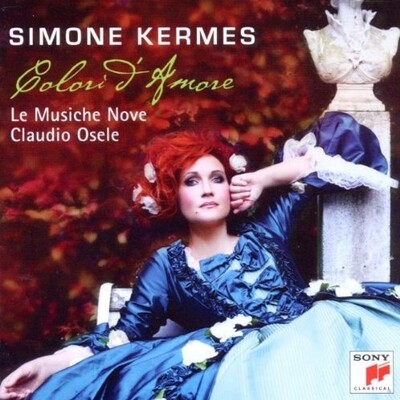
Colori d'Amore
Most of the arias in this recital come from forgotten 18th century works by well-known composers of Baroque period opera such as Scarlatti, Caldara,Bononcini and Broschi and are world premiere recordings. One aria did sound a bit familiar to me, Riccardo Broschis Chi Non Sente from his opera Merope which reminded me of his most famous "hit" the stately Ombra Fedele Anchio from Idaspe, an example I think of a composer recycling his best ideas. I remember there was a stunning performance of the latter aria in the 2009 Cardiff Singer of the World sung by a Ukrainian countertenor and this leads me into the slight problem I have with this recital. Many of these arias would have been sung originally by castrati such as the great Farinelli (Broschis brother) who possessed voices of considerable power and dynamic range. Im not sure how big Ms. Kermess voice is and she is not helped by an acoustic that sounds as though she was located behind the orchestra rather than in front. The light texture of the voice reminded me of the young Joan Sutherland and Ms. Kermes dispays a tendency of which the young Sutherland was sometimes accused, namely of singing as though she has a plum in her mouth so that consonants are sacrificed to creamy vowel sounds. Her technical proficiency, though, is quite dazzling and the recital is worth acquiring simply to hear the third track on this disc, Ondeggiante Agitato from Alessandro Scarlattis Il Prigionero Fortunato, as fine a display of baroque coloratura as youre likely to hear with its trills, echoes, pings and arpeggios. But I wish there had been a little more of this kind of fizz in this recital as I thought too many of the arias were of the stately declamatory variety. My personal preference is to hear these kind of arias sung by somewhat heftier voices such as those of countertenors, of which we now have no shortage of fine exponents, or by female voices with a darker hue (eg Vivica Genaux in her recital "Arias for Farinelli" or mezzos such as Cecilia Bartoli.) I cant help wondering whether Ms. Kermess voice might be better employed in the bel-canto repertoire of the early 19th century rather than the Baroque but, as I say, this is a personal preference and I dont doubt that this impressive recital will leave many gasping with admiration.
